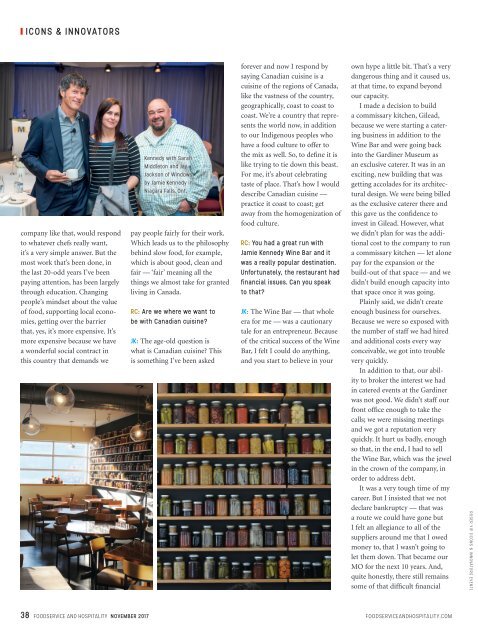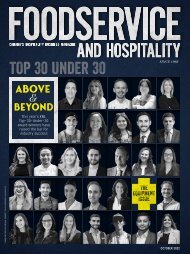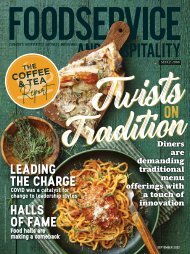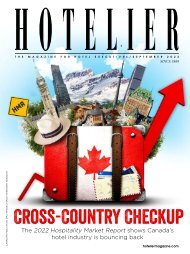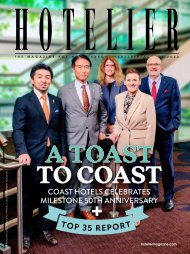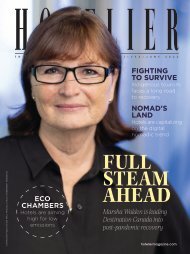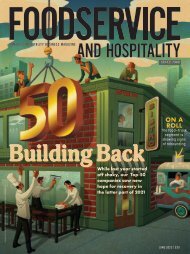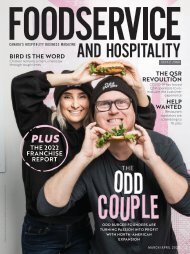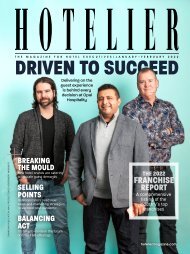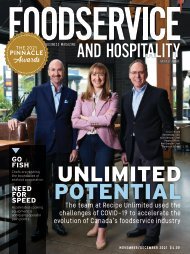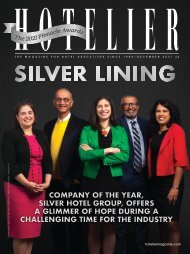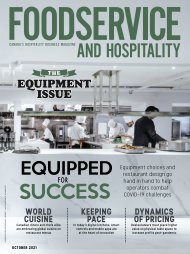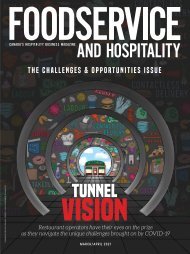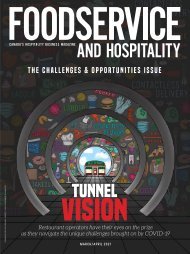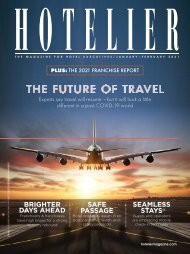FH1117
Create successful ePaper yourself
Turn your PDF publications into a flip-book with our unique Google optimized e-Paper software.
ICONS & INNOVATORS<br />
company like that, would respond<br />
to whatever chefs really want,<br />
it’s a very simple answer. But the<br />
most work that’s been done, in<br />
the last 20-odd years I’ve been<br />
paying attention, has been largely<br />
through education. Changing<br />
people’s mindset about the value<br />
of food, supporting local economies,<br />
getting over the barrier<br />
that, yes, it’s more expensive. It’s<br />
more expensive because we have<br />
a wonderful social contract in<br />
this country that demands we<br />
Kennedy with Sarah<br />
Middleton and Jay<br />
Jackson of Windows<br />
by Jamie Kennedy in<br />
Niagara Falls, Ont.<br />
pay people fairly for their work.<br />
Which leads us to the philosophy<br />
behind slow food, for example,<br />
which is about good, clean and<br />
fair — ‘fair’ meaning all the<br />
things we almost take for granted<br />
living in Canada.<br />
RC: Are we where we want to<br />
be with Canadian cuisine?<br />
JK: The age-old question is<br />
what is Canadian cuisine? This<br />
is something I’ve been asked<br />
forever and now I respond by<br />
saying Canadian cuisine is a<br />
cuisine of the regions of Canada,<br />
like the vastness of the country,<br />
geographically, coast to coast to<br />
coast. We’re a country that represents<br />
the world now, in addition<br />
to our Indigenous peoples who<br />
have a food culture to offer to<br />
the mix as well. So, to define it is<br />
like trying to tie down this beast.<br />
For me, it’s about celebrating<br />
taste of place. That’s how I would<br />
describe Canadian cuisine —<br />
practice it coast to coast; get<br />
away from the homogenization of<br />
food culture.<br />
RC: You had a great run with<br />
Jamie Kennedy Wine Bar and it<br />
was a really popular destination.<br />
Unfortunately, the restaurant had<br />
financial issues. Can you speak<br />
to that?<br />
JK: The Wine Bar — that whole<br />
era for me — was a cautionary<br />
tale for an entrepreneur. Because<br />
of the critical success of the Wine<br />
Bar, I felt I could do anything,<br />
and you start to believe in your<br />
own hype a little bit. That’s a very<br />
dangerous thing and it caused us,<br />
at that time, to expand beyond<br />
our capacity.<br />
I made a decision to build<br />
a commissary kitchen, Gilead,<br />
because we were starting a catering<br />
business in addition to the<br />
Wine Bar and were going back<br />
into the Gardiner Museum as<br />
an exclusive caterer. It was in an<br />
exciting, new building that was<br />
getting accolades for its architectural<br />
design. We were being billed<br />
as the exclusive caterer there and<br />
this gave us the confidence to<br />
invest in Gilead. However, what<br />
we didn’t plan for was the additional<br />
cost to the company to run<br />
a commissary kitchen — let alone<br />
pay for the expansion or the<br />
build-out of that space — and we<br />
didn’t build enough capacity into<br />
that space once it was going.<br />
Plainly said, we didn’t create<br />
enough business for ourselves.<br />
Because we were so exposed with<br />
the number of staff we had hired<br />
and additional costs every way<br />
conceivable, we got into trouble<br />
very quickly.<br />
In addition to that, our ability<br />
to broker the interest we had<br />
in catered events at the Gardiner<br />
was not good. We didn’t staff our<br />
front office enough to take the<br />
calls; we were missing meetings<br />
and we got a reputation very<br />
quickly. It hurt us badly, enough<br />
so that, in the end, I had to sell<br />
the Wine Bar, which was the jewel<br />
in the crown of the company, in<br />
order to address debt.<br />
It was a very tough time of my<br />
career. But I insisted that we not<br />
declare bankruptcy — that was<br />
a route we could have gone but<br />
I felt an allegiance to all of the<br />
suppliers around me that I owed<br />
money to, that I wasn’t going to<br />
let them down. That became our<br />
MO for the next 10 years. And,<br />
quite honestly, there still remains<br />
some of that difficult financial<br />
ROGER YIP [ICONS & INNOVATORS EVENT]<br />
38 FOODSERVICE AND HOSPITALITY NOVEMBER 2017 FOODSERVICEANDHOSPITALITY.COM


